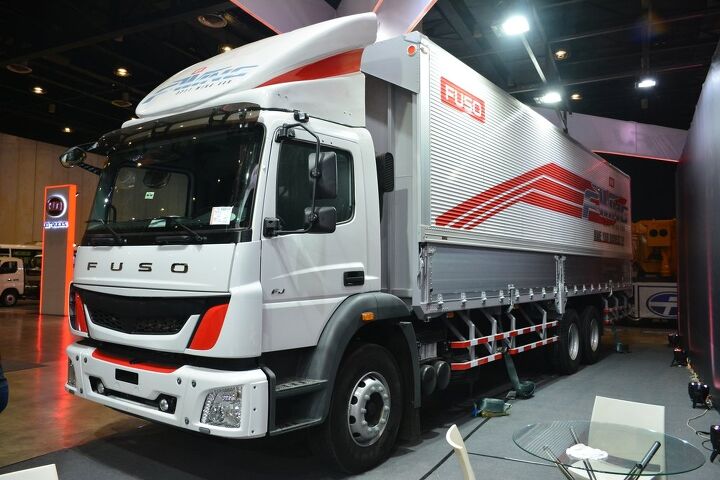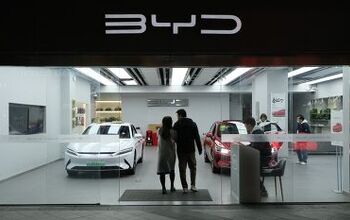Toyota & Daimler Merging Hino & Mitsubishi Fuso Truck Brands

On Tuesday, Toyota Motor Corp. confirmed plans to merge its truck-making subsidiary Hino Motors with the rival Mitsubishi Fuso that’s owned by Daimler AG.
If you’re confused by the news, Mitsubishi only has a minority stake in the Fuso brand with Germany’s Daimler having owned 89 percent of the whole since the early 2000s. Meanwhile, Hino Motors has been wholly owned by Toyota Motor Corp. since 2001 and enjoyed a working partnership with Japan’s largest automaker since the 1960s.
Now, Fuso and parent Daimler Truck have signed a memorandum of understanding with Hino and parent Toyota. Their stated plan involved merging Hino and Fuso into a publicly-traded holding company with equal investments from both Toyota and Daimler Truck Holding AG.
While probably not the hottest news for automotive enthusiasts, it remains a massively important deal for anybody tracking the broader industry or who happens to have a penchant for flat-faced box trucks. Despite being ideal for hauling heavy loads in dense urban areas, and longer routes in a pinch, smaller box trucks have been losing ground to the likes of the Ford Transit and Mercedes Sprinter.
According to Automotive News, the newly partnered Hino Motors and Mitsubishi Fuso Truck and Bus Corp. will be collaborating on commercial vehicle development, procurement, and production. Their stated goal is to become a "globally competitive" Japanese truck maker with an emphasis on serving Southeast Asia as the primary market.
From Automotive News:
"Behind this collaboration is our four companies' strong desire to create the future of commercial vehicles together," Toyota CEO Koji Sato said at a Tokyo news conference.
The shuffle comes as Toyota's Hino digs out of an embarrassing emission and fuel efficiency scandal and as Daimler looks to streamline its commercial truck holdings. Daimler separated its truck and car units in 2021 as part of a wider industry trend of spinning off commercial vehicles.
Nissan sold its truck subsidiary to Volvo in 2007, Volkswagen renamed its truck and bus unit Traton in 2018 and listed it on the Frankfurt and Stockholm stock exchanges the following year.
Hino fell into trouble in March 2022 with the revelation it had been falsifying emissions and fuel economy data dating as far as 2003. The scandal snowballed later that year when Hino said new problems were discovered in a light-duty engine, among revelations in other power plants.
Emissions issues are becoming incredibly difficult for manufacturers to contend with. But this has become especially true for commercial vehicles which need to keep costs and complexity down to help with fleet sales. As excited as some of the larger businesses seem to be about electrification, most small and middle-sized businesses tend to prefer basic vehicles that won’t break the bank — regardless of whether we’re talking about the initial investment or maintenance costs.
However, it sounds as though Toyota and Daimler want their truck division to chase down modern trends. Vehicle development is supposed to focus on achieving carbon neutrality and the duo claimed that Fuso and Hino would support the development of hydrogen, autonomous, connected, and electrified technologies.
"Simply put, the world is changing, and our industry needs to change with it," Mitsubishi Fuso CEO Karl Deppen stated.
Additional details of the merger are supposed to be decided over the next 18 months. The involved businesses want a definitive agreement in the first quarter of 2024 and for the deal to close by the end of next year. That means we’ll be getting updates on the corporate structure and a financial breakdown of who owns what. Assuming this is to be a complete merger, the joint trucking arm is also likely to need a new name — as Mitsubishi-Fuso-Hino is quite the mouthful.
Obviously, the deal could fall through before next year. But, with both brands having suffered trouble in recent years, it makes sense for their parent companies to chase down synergies in the hopes that it’ll yield something they can both profit from while sharing the investment burden.
[Image: Walter Eric Sy/Shutterstock]
Become a TTAC insider. Get the latest news, features, TTAC takes, and everything else that gets to the truth about cars first by subscribing to our newsletter.

A staunch consumer advocate tracking industry trends and regulation. Before joining TTAC, Matt spent a decade working for marketing and research firms based in NYC. Clients included several of the world’s largest automakers, global tire brands, and aftermarket part suppliers. Dissatisfied with the corporate world and resentful of having to wear suits everyday, he pivoted to writing about cars. Since then, that man has become an ardent supporter of the right-to-repair movement, been interviewed on the auto industry by national radio broadcasts, driven more rental cars than anyone ever should, participated in amateur rallying events, and received the requisite minimum training as sanctioned by the SCCA. Handy with a wrench, Matt grew up surrounded by Detroit auto workers and managed to get a pizza delivery job before he was legally eligible. He later found himself driving box trucks through Manhattan, guaranteeing future sympathy for actual truckers. He continues to conduct research pertaining to the automotive sector as an independent contractor and has since moved back to his native Michigan, closer to where the cars are born. A contrarian, Matt claims to prefer understeer — stating that front and all-wheel drive vehicles cater best to his driving style.
More by Matt Posky
Latest Car Reviews
Read moreLatest Product Reviews
Read moreRecent Comments
- Dave M. I'm sorry to see any storied name go away. The lifespan of the Malibu has fit perfectly in my lifetime years-wise. Some of the highlights include the first and second generations, the '78 revamp (very clean design), and the 2005 generation. Ford, GM and Mopar gave this segment away by allowing Toyota and Honda a foot in the door and then always having to play catch-up. How hard is it to make a truly competitive sedan at a profit? Obviously, Japan Inc. figured it out.I've driven a few rentals these past years; the Malibu got the job done but honestly the Passat and Altima were my rental preferences.
- Kcflyer actually yes. It's a shame that a product this uncompetitive can still outsell GM's entire EV offerings. Those products have had billions thrown at them. Imagine how nice the new Malibu, Impala, SS, and Lacrosse would be with that kind of commitment.
- 3SpeedAutomatic Nope....
- Bd2 Looking forward to flooding the rental lots with Hyundai and Kia models, this is just one obstacle now eliminated.
- Kcflyer keep the color. lose the stupid front design. make it reliable, at least as reliable as a base 911. Then and only then is it somewhat worthy of that price.


































Comments
Join the conversation
Sounds anticompetitive. Or maybe Toyota wants to get out of the truck business rather than have to get involved in electrification?
Another successful automotive company for Daimler to tear down. We all know how Chrysler was torn apart.....now round two.